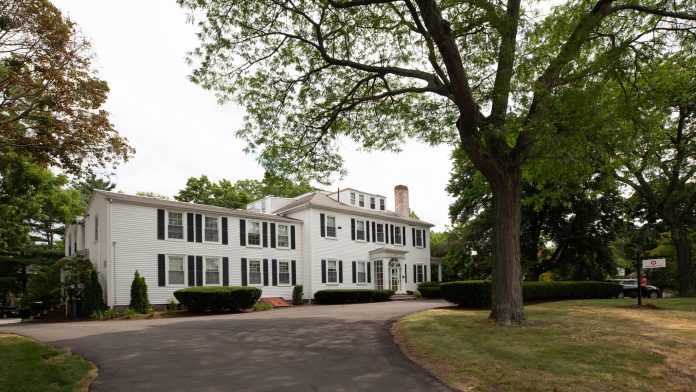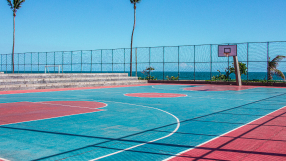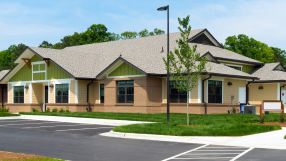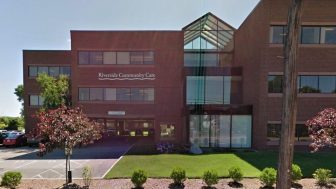Northeast Addiction Treatment Center NEATC
36 Miller Stile Road
Quincy, MA 02169
Quincy, Massachusetts
855-265-2159
Get Help Now - 617-675-3905
 Who Answers?
Who Answers?

Amenities

Art Therapy
Art and music are mediums that connect with our feelings, making them a great recovery tool during addiction t...reatment. Studies show that combining art/music and drug rehab can have a greater therapeutic impact than drug rehab alone, as you’re able to access parts of your brain and body that you may not have access to during traditional talk therapy. Benefits of art/music therapy include lowering stress and anxiety, promoting healthy neurochemicals, and providing stress relief.Read More

Basketball Court
When used as part of an evidence-based treatment plan, basketball can boost physical and mental health, lead t...o sharper thinking, and facilitate improved self-esteem. Drug rehabs with a basketball court also place a focus on teamwork and cooperation.Read More

Adventure Therapy
Hiking is a great way to relieve stress, get perspective, navigate challenges, connect with nature, and improv...e your health - all essential components of sustaining long-term recovery. Studies also show that the body releases endorphins during physical activities like hiking. These endorphins improve mood and act as a natural pain reliever.Read More

Meditation Room
Yoga and meditation are great activities to support your recovery process during alcohol or drug rehab. These ...therapies have been around for centuries, and they are an effective way to improve well-being. Combining addiction treatment, yoga, and meditation can reduce cravings, improve sleep, relieve anxiety and depression, provide stress relief, promote relaxation, support emotional healing, and improve energy levels.Read More

Music Room
Music can be extremely therapeutic, serving as a valuable healing tool and an integrative feature of a holisti...c treatment plan. A music room offers a large number of outlets, including singing, playing musical instruments, and listening to music.Read More

Private Rehab
Private drug rehab provides a comfortable, secure environment that allows you to focus on doing the work to ge...t your life back on track. Benefits include a higher staff-to-client ratio, increased one-on-one time with therapists and healthcare providers, private rooms for clients, and customized forms of therapy.Read More

Private Transportation
Transportation services are designed to ensure your addiction treatment begins and ends successfully by offeri...ng free transportation to the rehab facility, to and from your appointments during rehab, and back home upon program completion.Read More

Residential Setting
Residential drug rehab provides the comforts of home with the therapeutic support needed to successfully recov...er. Benefits of an inpatient program include increased safety, a higher success rate, and the time and distance given to focus on recovery. Residential drug rehabs are often the preferred method of treatment, as they can be tailored to meet specific needs, offer focused therapeutic care, and provide the necessary tools to sustain recovery.Read More

Yoga Studio
Treatment centers with a yoga studio offer a special form of holistic therapy during the recovery process. Yog...a boosts mindfulness, a sense of calm, and healthy reflection during drug rehab via breathing exercises, stretching, and a progression of specific postures.Read More
Addiction Treatment Programs
Adult Program
Alcoholism
Cognitive Behavioral Therapy (CBT)
Fitness Therapy
LGBTQ Friendly Rehab
Men's Rehab
Rehab For Veterans
Opioid Treatment
Rational Behavior Therapy (RBT)
Women's Rehab
Teen & Adolescent Program
Adult Program
Each adult program in Massachusetts is designed to help individuals over the age of 18 recover from addiction to drugs or alcohol. The length of the program and its intensity varies, based on the needs of the individual.Alcoholism
Most alcohol rehab in Massachusetts consists of individual counseling and group therapy sessions, which address mental and emotional concerns that are contributing to alcohol use. Treatment helps participants make changes to maintain sobriety and prevent relapse.Cognitive Behavioral Therapy (CBT)
Cognitive behavioral therapy in Massachusetts is a hands-on method that engages participants in changing their thought and behavior patterns. Rather than a talk-listen approach, individuals are actively involved in working with their therapist to treat their addiction.Fitness Therapy
Fitness therapy is an evidence-based complementary approach to addiction recovery and mental health care. Based on mounting scientific evidence of the benefits of physical activity in improving mood, enhancing clients’ sense of wellbeing, and decreasing depression and anxiety, fitness therapy encompasses a wide spectrum of intensities, from gentle yoga, qigong, and tai chi to weight training, kickboxing, and other highly physical activities.LGBTQ Friendly Rehab
LGBTQ-friendly rehab in Massachusetts offers programs targeted to the unique experiences within this diverse community. Staff specialists understand that an environment promoting acceptance makes it easier for people to open up and focus on healing.Men's Rehab
For men who want to stop drinking or using drugs, men’s rehab in Massachusetts offers help and hope. These treatment programs, designed specifically for men, help participants recover and rebuild their lives.Rehab For Veterans
Veteran’s rehab in Massachusetts offers recovery for Veterans who are struggling with substance use disorder. Treatment programs are trauma-informed, so Veterans who are facing other mental health challenges receive treatment for co-occurring disorders as well.Opioid Treatment
When you enter opioid rehab in Massachusetts, you’ll receive treatment in a supportive environment that encourages recovery. After successful withdrawal management, you’ll participate in a variety of evidence-based therapies that prepare you for long-term sobriety.Rational Behavior Therapy (RBT)
Addiction therapists apply rational emotive behavioral therapy in Massachusetts to focus on the interconnectedness of behaviors, thoughts, and feelings. The aim of therapy is for these three things to work together to improve your quality of life rather than lead to dysfunction.Women's Rehab
Women who are seeking treatment for substance use disorders can receive various levels of care at women’s rehab in Massachusetts. Programs include detox, partial hospitalization programs (PHP), intensive outpatient programs (IOP), telehealth programs, sober living, outpatient, and aftercare.Teen & Adolescent Program
Teen and young adult substance abuse can set individuals on a life-long path of destruction. A young adult program in Massachusetts can intervene in young adults’ lives to set them on a better path during this crucial stage of life.Levels of Care
1
Partial Hospitalization Program (PHP)
Partial hospitalization programs (PHPs) in Massachusetts provide many of the same treatment services as an inp...atient program, but you don’t have to stay overnight. PHPs often provide a bridge between inpatient and outpatient treatment.Read More
2
Outpatient Rehab
Massachusetts outpatient rehab does not have a defined timeline. The program is tailored to meet your recovery... needs, and may last 90 days or a year or more. During this time, you will attend therapy sessions and support group meetings, for ongoing accountability and development of sober-living skills.Read More
3
Aftercare & Alumni Program
Aftercare rehab in Massachusetts gives you continued access to support after rehab. You may need assistance wi...th job coaching, budgeting, education, or accountability as you re-enter your life. Aftercare programs provide these supports, so you can face challenges and maintain a sober lifestyle long-term.Read More
4
Dual Diagnosis & Mental Health
If you meet the diagnostic criteria for two or more conditions, you have a dual diagnosis. Massachusetts dual ...diagnosis treatment is designed to address both conditions simultaneously, for improved recovery outcomes.Read More
Accreditations

LegitScript Certified

SAMHSA

Joint Commission
Insurance
 TRICARE
TRICARE
Administered by the Department of Defense, TRICARE offers comprehensive military health insurance plans for ac...tive and retired military members and their families. Similar to PPO programs offered by private insurance companies, TRICARE covers multiple levels of care for addiction treatment, including detox, inpatient rehab, and outpatient services.Read More
 Private Insurance
Private Insurance
If you have private insurance, you can use it to help cover the cost of treatment. Most rehab insurance polici...es tend to have different coverage rates and costs that policyholders are responsible for paying, so check with your insurer for detailed information.Read More
 Self-Pay Options
Self-Pay Options
If you prefer to take control of the cost of your treatment, you can opt to pay for it yourself through self-p...ay options, also known as private pay. This option provides access to all levels of care — from detox to inpatient rehabilitation — because you’re not limited by the rules of insurers or state-run programs.Read More
 Sliding Scale Payment
Sliding Scale Payment
If you can't pay the full cost of treatment, a sliding scale payment plan may be a solution for you. This opti...on provides access to all levels of care. To qualify for this treatment discount, you must complete an application and provide supporting financial documentation.Read More
Contact Northeast Addiction Treatment Center NEATC



